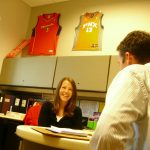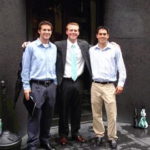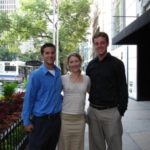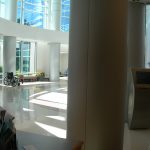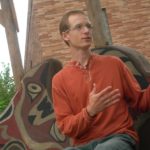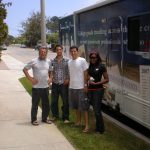Interview: How To Start a Poster Printing Business
I’d like to know why Hatch Show Print is so special. What’s the pitch that you give everyone?
I’m glad I don’t have to give a pitch. People seem to figure it out with their own senses.
So you’re saying that you don’t have to give a pitch. This place explains itself. But what’s the deal with this place? Why is it so special to Nashville?
When I say I don’t have to give a pitch to this place anymore, there is so relevance of truth to that. But I used to have to give the pitch about this place all the time. That figures into the larger connotation of what passion is.
I started here in 1984. And I’m honest when I say I needed this job as much as this place needed me. I was impressed with the history of the shop and I knew that simply, preservation through production would be the mandate for which one could get the shop up and running.
It was gurgling blood and dust was collecting on the blocks. It should have been ink being rubbed off the blocks. So just getting the presses up and running and talking about the shop. I’ve always liked people. So my pitch back in the ‘80’s was ‘What a great place. Let’s keep it together.’
That means jobs. Whatever I can do to get revenue generated would be the best thing for the soul of this shop so that this block doesn’t end up in a Philadelphia flea market, and that block doesn’t end up in a Seattle antique store and that one doesn’t end up as a coffee table. And that one doesn’t end up in the dump.
So I understand when people who have never seen this shop before come in and say, ‘I’ve never seen anything like this!’ I still get it after 23 years of working here. That makes me feel good about having the passion to operate to the shop.
So how are these posters actually made? What’s the process?
If you look at the process of how the blocks are made, let’s go back to the word passion again. It is a great word. The fact is that it takes a great deal of skill and a passion for the technology which is letter press. Either the images are carved or they’re etched. More importantly, all of the information the individual letters are handset to compose the words. The job is finished and we put the type away. Then we start over on the next job.
In the shop here, the printer is the designer and the designer is the printer. The place has been around since 1879. I’m sure that the Hatch family had passion for what they were doing as well.
I guess the definition for me would be different in the sense that we are now in our third century of operation with the 21st century, and we’re still doing letterpress. We still do over 600 jobs a year. And are host to, I can’t believe it, over 40,000 people come into this place every year. Just to see what we do here.
It can be young people who want to learn about graphic design. It can be a guy whose dad played him Johnny Cash and wanted to see what a Johnny Cash poster looked like. It could be the students that we had this summer. Many summers in a row. Interns from different universities that want to learn about design typography. It could be the old guy, true story, the old guy whose son brought him in. He used to run a letterpress shop. He was actually Thomas Edison’s yard boy and was one of the secret printers to print the Normandy Invasion maps. You never think of those jobs. You think someone had to print those maps. He was behind seven concrete walls I’m sure and five locked doors with three guards, but they entrusted people to print. He had a passion for what his job was. And I’m sure that we showed him a good time by demonstrating our fascination with letterpress the day he visited here.
So you’ve been here since 1984 and you mentioned that you didn’t want these blocks to gather dust and end up at a garage sale. Was there a time where Hatch really wasn’t that popular? Where no one wanted these posters and you had to put that passion into it to bring it to the next level and make it popular again?
If you went back to 1952, then you’re at the year that Mr. Hatch passed away. The Hatch family, Charles and Herbert started the shop in 1879. They gave it to William T. Hatch in 1921.
When you look at all the generations of folks who’ve run the shop, go back to 1879. Charles and Herbert Hatch started the shop when Edison invented the light bulb. Then in 1921 they turned the shop over to the nephew, William T. Hatch. He passes away in 1952. New technology is coming in called offset printing. No one thought it would be off value. But this place trudged along with different managers and different reputations. It wiggled on its knees through every decade. It was in a building in essence, a national landmark. Literally, it was a national landmark. But of no aesthetic value. We all knew that one day, it would have to move. This is an important part of it, because the real estate values. I just wanted to raise the profile of the shop high enough so that when the day came that some skyscraper would be put on top of this, we would at least have had an impact historically and culturally and aesthetically to the city and that we would have help relocating by having a place to relocate. That’s exactly what ended up happening.
In 1991, the skyscraper came. The quick version of the story is everyone worked together and got us relocated. After that its been no looking back here. So letterpress is of course the only technology we do here. I can’t say it enough.
Well, I’ll say it best this way. Go to Jamie Mahoney who teaches at Virginia Commonwealth in Richmond. She puts me in front of a class of kids, and she says, ‘Today we are going to evolve from the computer and learn about letterpress.’ I thought that was a great of introducing me.
So why are you personally passionate about letterpress and posters and the people that come in here?
I think it’s in my gut. It’s in my DNA. Or I fell from the sky with ink in my eye. Or something.
I knew that it was such a unique place. You’ve got a Johnny Cash plate next to the Hank Williams file. You’ve got the Bessie Smith photo next to some other icon next to someone you’ve never heard of. But they’re still these gourgeous plates.
I do like history. Like is not even a strong enough word. I have a visceral connection and an identification with what’s valuable historically. I’m aware that my life is not even the length of the thumbnail that you trim off when you look into the scheme of things. But while I’m here, I enjoy what I’m doing. I enjoy it everyday. I’m glad that I’m able to hopefully be articulate about the shop. I’m fond of saying I’m the shortstop that never wanted to be traded.
I came from a family where education was stressed. I came from a family where dad had the same job his whole life. I know jobs change a lot these days. A lot of people move from this place to that place. I’m glad that I’m able to have some roots here at Hatch in Nashville.
So you’re still going to be the shortstop that doesn’t want to ever be traded.
I’m telling everyone that when I’m 59 ½ I’m retiring. I’m going. I’m leaving here at 60. So I got 10 more years to do this. Then I’m happily pass it on to someone else.
What were you doing before you came here? You said earlier that you needed this place as much as it needed you.
Waiting tables. There’s more to that. And this is the kind of thing your readers would be interested in.
I grew up in Kansas. I went back to school here in Nashville. Didn’t really care what I was going to take, just knew it would be a good idea to get a degree. Asked a complete stranger who I was carpooling with what class he was in. He said print making seemed pretty simple.
So I followed him to the class like a lost dog and I fell in love with print making. I graduated with a history and English majors and minored in foreign languages. I don’t have a chance to get a senior show. I’m disappointed that I don’t get to have a senior show because I’ve done all these wood blocks and linoleum blocks in school. Which is where I developed a passion for it for the carving.
So I have a rinky dink show in a rinky dink restaurant here in Nashville. A Vanderbilt art teacher sees and says I have to see this dying old poster shop before it goes out of business. I’m waiting tables five blocks away and I fall in love with Hatch.
I write a proposal telling the owner at that time what I feel like I can do with the shop. I’m glad to say that he read the proposal. Here it is 2007 and I’m talking to you fine young men here.
Technology is what I guess you could say in a sense has become antiquated at some point but you have all this history. There’s a lot of them that aren’t as lucky to, I mean these are preserved here in Hatch because you’ve gone through all the trouble of doing it. There’s still a big appeal to the public. How important is it to do that? Because there is a lot of history and technology that’s been lost because no one bothers to look at it and save it and watch it.
It’s a great question. And I know I don’t have to repeat that for the interview. I’ve decided…I am going to say this. If the shop went away tomorrow, by natural disaster or disaster period, I hope I’m in a place spiritually where I could accept that. I think I am. Which is why I’m even talking like that. But I think…I don’t want it to happen. But I think it’s that same appreciation for history, living and lost, that I have for this place.
I’ll enjoy it every day while it’s living, and I will have known that I enjoyed it to the fullest if ever it becomes lost.
For the time being, I’m so proud to be able to say 40,000 people come into here every year. I get to go to the schools, the professional graphic design forums and speak. Nice guys like you get to come in. And I’m glad it’s Friday afternoon and I get to go home.
But I’ll look forward to Monday also. Hopefully some of that rubs off on my staff. I’m very proud of them as well.
That’s a really heavy sentiment. Are you that way about other things in your life as well, or is it just this place and the small bit of history and culture of music that you feel that way about it? Or are you that way about a lot of things?
I think that if one becomes so possessive about anything, you’re setting yourself up for heartache, loss, tears, the darkest alley. I don’t want to do that. Again, spiritually, professionally, privately, I’m so grateful for what I have. I would fight to the death to save this. But I don’t want to become so attached to anything.
It’s not a self preservation aspect. I think it’s just a way of saying thank you for the time that I was privileged to be a part of something else here. If it goes it goes. Because even on the most practical level, we could just bang our heads apart wishing that Visouvious never dropped all the lava on Pompea. But it did.
We could look at everything around us and say, ‘What were we thinking when we tore this building down?’ My hometown of Salina, Kansas. My dad sent me this beautiful piece of paper about all the buildings that were lost in the sixties, seventies, and eighties. Gorgeous structures.
You can’t go back and wish. All the posters that are gone from this place. There’s no Elvis posters. There’s no Bessie Smith posters in here. I can’t get upset about that. What I can do is make posters and my staff make posters that are ready for people to enjoy in the future.
I can’t be upset about history lost, knowing that I am in the process of making tomorrow’s history today.
Well in a very healthy way, this place, the printing that goes on here is as transitory as yourself when you talk about that you’re no bigger than a thumbnail. It’s nice that we’re here at this time being able to experience it. All of us get to see this. But at some point, everything kind of comes around and comes to pass.
It’s hard to not only accept that, it’s hard to envision that. It’s hard to say, ‘Wow. That great restaurant was just here a year ago after being in business eighty years. I wonder what happened to it?’ And it’s gone. So be grateful for the time that you got to see it, instead of being sad for the fact that it’s gone tomorrow or the next time you drive by it.
I think that’s just a healthy way to look at it. Believe me, it’s taken me years to get to that place. You just don’t wake up and think that. Life’s struggles give you that observation.
Well this place definitely seems pretty special. It’s cool.
Thanks for saying that.
Can you spell your name?
Yes, and thanks for asking. I’ll pronounce it for you too. Jim Sherraden. I’m always saying Sherraden like Aladdin. It’s spelled S as in Sam, h, e, r, r, a, d, e, n.
And what’s the title that you have here?
Manager and janitor.
Kerouac does not want us to change our whole lives and get on the road like he did. He was wanting to tell about his time. But to copy that was not his plan at all. Let this influence your life and move on. You don’t want it to influence your life where you think you can life in your car for four months and end up in hooker’s heaven in Mexico.
He was really upset about the interpretation.
This is my shop. Hopefully it will inspire others to do better things.

